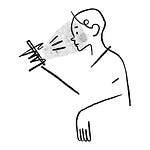Routines are going to the grocery store on Tuesday mornings, listening to that one podcast in the school pickup line, and brushing your teeth twice a day. What, then, are rituals? Seth and Tsh unpack why they matter — because they tie our actions with our beliefs and values — and why both the big and small ones matter. Weddings and graduations are necessary, yes, but so are Friday pizza-and-movie nights, evening neighborhood walks, and praying along those beads.
Seth: Newsletter | Twitter | Instagram | Website
Tsh: Newsletter | Twitter | Instagram | Website
Support the show — buy the next round of drinks!
Subscribe to the show’s Substack
Find all the episodes
Tsh’s Rule of Life workshop
Assurance, by William Stafford
The Anthropocene Reviewed, by John Green
Scroll down for the transcript
Tsh: This is A Drink With a Friend, I’m Tsh Oxenreider.
Seth: And I’m Seth Haines.
Tsh: Seth, what are you drinking for lunchtime?
Seth: It is lunchtime and typically I start to wane from caffeine but I am so tired lately and this is maybe a little bit too much information but I had a muscle twitch all night last night. It kept me up until three in the morning. So, I’m drinking coffee. But it surely for the caffeine, it is not good coffee. It’s office swill.
Tsh: Office coffee.
Seth: It’s the worst. I don’t know what to do about it though. What are you drinking?
Tsh: I’m drinking my apple cider vinegar weird hippie cocktail. As a reminder, it’s two tablespoons of apple cider vinegar, a pinch of Himalayan salt, a squeeze of lime, and sparkling water. It’s weird and I’ve grown to really love it and I drink it about once a day now. I keep alluding to this and I’m sure eventually talk about it but I’m doing this weird intermittent fasting/eating routine and I do this on the days that I don’t each much because it’s good for electrolytes.
Seth: I think we should find a co-packer for this and see if we can bottle it. See if we can sell it as the Tsh Mocktail. What could we call it? The Oxentail?
Tsh: The Oxen Mocktail? The thing is I’ve had a bottled version of it, the brand Bragg’s sells some version of this and it’s not as good. I like mine better. I might be on to something here.
Seth: Let’s do it. Then they can sponsor the show.
Tsh: That’s right. Then we can have them sponsor.
Seth: It’s just all circular.
Tsh: Today’s topic that we want to unpack is the idea of rituals. I mean it slightly different than routines. With the end of spring in mind with those of us in the northern hemisphere, we’ve got a lot of graduations, we’ve got the end of the school year in general, and the start of summer. Weddings tend to happen a lot in early summer. We’ve got a lot of these rituals and they’ve been on my mind because we’re doing more rituals, my family personally, that we missed out on a year ago because of Covid. I’m just thinking about them and contemplating why they matter, why we as humans do them. Before I share my thoughts, I want to know your thoughts. Do you have any rituals this time of year that you either love or begrudgingly attend?
Seth: Not really. We have kids that have ages from nine to sixteen so somebody is always graduating for something, which I always think is funny when you have a kindergarten graduation.
Tsh: I know.
Seth: Or like a junior high graduation. Because of the spread, somebody is always graduating from something so there is that sort of turning over the leaf. My kids go to a school where at the end of every year they have an awards ceremony but at that awards ceremony they also give them their “tribal names”. More than anything, it’s kind of a blessing, a way of saying here’s what we saw in you this year, and here’s what your name is.
Tsh: Hmm.
Seth: For instance, this year they already had the ceremony for the seniors and I went and the tribal names were organized around Bob Marley songs. It’s fun, it can be anything. It can be animals, European continents, whatever. It’s always really fun and it’s a ritualistic send-off from one grade to another. Here are the things that you achieved and here are the things that mark this year for you and now since this year is over and it’s been marked by your name, now go forward into your new name. That’s kind of interesting. It’s something that my kids do more than I do but I always look forward to it every year.
Tsh: Rituals are kind of weird but I find it more fascinating how important they are in the span of human history. We have been ritualistic since written history. I was digging a little into what they are exactly to prep for our chat here. What is the difference between rituals and routines? Routines are like, I go to the grocery store on Monday’s but clearly, something like graduating from high school is more important. Not so much the graduating but the ceremony itself, clearly that’s more stand apart than me going to the same grocery store roughly at the same time every week every year. I was trying to unpack what is the difference then and why do they matter? The thing I’ve come down to is this idea that routines are things we do to use our time well. In a way they’re more, I mean, they might have some inner benefit of keeping our stress low, but for the most time, they are for practical reasons. They use our time well. Versus rituals are things we do rhythmically to tie our actions to our beliefs. What we do outwardly or what we do in action, the way we participate in a thing is directly because of something we believe to be true. I think this is a really interesting thought about our lives in general but I think we could even get more specific about our spiritual lives with you and I having been raised in a non-liturgical environment to being where we are now and that those things matter. That to me is what’s really interesting about rituals. Our bodies clearly matter and we believe them even if we roll our eyes at things like kindergarten graduation because I do too.
Seth: I think that’s one of the things that been really powerful for me over the last year is just being constantly engaged in rituals even when I don’t feel it. Even when I’m not feeling like standing, sitting, kneeling, going through that whole full-body gyration every Sunday of rituals. Somehow that is super-grounding to me especially when you get in this frenetic pace, this world that’s insanely fast and in that insane fastness, every week I have a ritual that stops me at least for an hour, depending. Depending on who’s preaching because sometimes it’s only like forty-five minutes if it’s a quick sermon, a quick homily. Otherwise, normally for an hour, I’m stopped. I’m slow. I’m pulled into this ritualized context and it does something for me. It does ground me. Maybe it’s putting my body in the way of belief, maybe that’s it? Maybe it’s just stopping the crazy and stopping me that’s so important. I haven’t really thought that through.
Tsh: I think the additional point that matters is the idea of rhythmically, meaning we are ridiculous humans who need this more than once a year or just every now and then when we feel like it. We need it every week. Or we need it really regularly because we are prone to forgetting what matters to us. We’re prone to leaving whatever ritual we’re talking about and moving on to something else and then it just gets shoved off to the side. This need for rhythm in our lives I think really speaks to the heart of what we’re getting at and thinking about last year, 2020, how Covid and quarantine put so much of that on hold. We’ve already talked about the good side of, not having to be everywhere, but we missed out on things like going to church regularly in person, kids didn’t get to go to prom and we saw the loss of that globally. I thought that was really interesting.
Seth: And kindergarten graduations. Did anyone go to a kindergarten graduation? Highly doubtful. In fact, we had our senior high graduation last year was all virtual and I remember watching it and they actually filmed part of it from a drone or something or maybe it was live-streamed part of it from a drone so after the closed ceremony they all went out to this parking lot at the mall here in Fayetteville and they got on these flatbed trucks. These students were elevated on separate flatbed trucks and then you could drive by in your car as a family unit and yell out the window. If you couldn’t go they had this little drone that flew over the parking lot and took footage and streamed it back which was fascinating and interesting. The whole context of graduation changed, the whole ritual changed, the things that you do just because that’s what you do changed. We had to all stop and think, what does this even mean? I remember, too, speaking of the pandemic, last year we were supposed to enter the Catholic Church on Easter, at the Easter vigil. I remember just watching that and thinking, this was supposed to be my ritual. This was supposed to be the way that my family entered into this beautiful extended ritual. When we finally did make our way into the church it was through a very quiet service, maybe 100 people were there. It was just a very different, almost anti-climatic sort of entrance that felt like a real relief but by the same token, there was something about that ritualized experience that we all stopped and thought, oh man, we feel like we missed something because we didn’t have the ritual. Maybe that’s another way to look at it is to say what are the rituals that we attend because they’re spiritual in nature, they’re physical in nature. Working out would be a physical ritual for me. Maybe communal rituals, too, like when we’re talking about the kindergarten graduation. I think we need to title this episode, “The Ritual of the Kindergarten Graduation”.
Tsh: Because it keeps coming up!
Seth: It keeps coming up! Again, why do you attend weddings? Why do you attend the kindergarten graduation? Why do you attend these non-profit dinners in the pre-Covid age? There was a communal piece. Do you believe community is important and a big thing so if you believe that then you embody it by going into these rituals.
Tsh: I actually love that you said that because I actually jotted down before we talked, the three things, the three reasons we have rituals. The first one was they form a common identity. I think that speaks to your kids’ school and their tribal names. It helps you sense belonging to a group that shares that ritual. An example in my kids’ life and I guess in mine as a teacher is, we end our school year with something called a Cardboard Boat Regatta. The last two weeks of school, kids are put into teams and they have to build a boat using nothing but cardboard and duck tape.
Seth: Oh boy.
Tsh: It’s very fun. We have heats and a tournament and the last boat standing, the whole bit. It’s very funny to watch because you’re watching as an adult the engineering process and you know, that is not going to last long. It’s a really cool experience because they get to learn about physics and the whole thing. But we didn’t get to do that last year. I will be honest, as a parent, my initial response was woo-hoo! One less thing to do. One of my kids feels that way but the other two were genuinely disappointed and I thought, wow, this thing matters to you, that is interesting to me. One of them, it was mostly because this is so much fun. The other one was because that was how she marked the end of the school year. I was going to say the second reason we have rituals to both create and mark time. We create a sense of time, if you think about it, late May is really an arbitrary time to end a school year. It’s antiquated back from the days when most of us were farmers but we still do that and we like having some kind of end-of-the-school-year cutoff to remind us this is what we’re doing. They mark time by way of the liturgical calendar and birthdays and holidays. But then the third reason, and this is, I think, what you’re getting at with perhaps the CrossFit, is this idea of they serve as Ebenezers to us. They serve as reminders of what we care about. For me, I’m thinking of my walking, I’m on day 32 now of walking 5-6 miles a day. I get half of it done in the morning because I want to start off my day that way and on that walk I remind myself, this is what matters to me, I care about this. The being outside, having time to think and be alone, and having time to move my body, all those things. I need that reminder. Even though I can spend the rest of my day going about saying, that kind of thing matters to me, but I’m reminding myself physically this matters to me when I’m doing it.
Seth: Without the ritualized practice, it’s just words. Right?
Tsh: Right?
Seth: We can say whatever we want to say but if you don’t put your body in the way of something or in the motion of something, of doing something, then it’s just words. One of the things that I find so freeing to me about, for instance, saying the Creed every week, is that there are some Sundays when I’m just saying it. I’m not feeling it. I believe it but it’s not there for me. Then there are other weeks when it’s deeply impactful and meaningful. The weeks when it has been the most impactful and meaningful are typically the weeks that sneak up on me. I just go because it’s the ritual, it’s the thing that I do on Sunday and then I find myself near tears saying the Creed out of nowhere. Again, I put my body in the way of doing something that I believe, and as a result that belief gets a chance to really root into me and to really do the work that it’s meant to do. There’s something really beautiful about that. There are times when I don’t feel like going to the gym and I go and all of the sudden I find myself really full of energy and really full of life and really invigorated. There are times I don’t feel like going to a graduation ceremony or a tribal naming ceremony and every time without fail I end up crying. [cry voice] Oh, they’re going on to such a sweet part of life. [cry voice end] I think there’s a real gift in putting ourselves in the motion, in the way of rituals. The gift is that when we do that, sometimes the belief can sneak up on us and surprise us and remind us how much we actually believe the thing that we’re participating in.
Tsh: It’s so true. I love that you brought up the Nicene Creed because that was one of my first draws to going to a more liturgical church when we became Anglican five or six years ago because we were in this season of deconstructing or whatever the term is these days. I wasn’t sure what I believed anymore but I loved that I could say that every week because it was a reminder to my brain that I’m not sure what I believe about a lot of things but I at least think I can agree with these things. There was something also comforting about the common identity that people had been saying this for 1700 years, or whatever it is. It made me feel tied to people who are smarter than me. I don’t know what I think but I think there is some wisdom in the idea of something really, really old still being true. I think that’s a huge appeal to something like the liturgy is tying you back to the past and helping you feel less alone in what you think. This keeps going where I don’t mean it to go, we have both said before that one of the appeals to our having become Catholic is this idea of not having to have to think about what it is you believe. That can sound really weird. We don’t mean you don’t use your brain but we mean we submit to the idea that perhaps there are those that are wiser than us and I think these rituals help us remember that at least when it comes to idea spiritually. But I can see that too in all sorts of ways. When it comes to health, I am doing this thing even if I don’t feel like it because doctors and scientists have given us ample proof that it is good that we get enough sleep or whatever it is. Submitting to truth even though we don’t feel like is healthy for us.
Seth: It doesn’t necessarily mean that you don’t do the research and that you do shut your brain off. It doesn’t mean that you don’t have questions. It doesn’t mean that you don’t even question things that are within that certain discipline or that certain ritual.
Tsh: For sure.
Seth: To make an analogy, there are times when I walk in and they’re like, today we’re going to be doing Kipping pull-ups. I’m like, we are? Are we really going to do that? I don’t know if I believe in that. In the same way, there are still things that I struggle with within my particular faith structure and I’m sure you do, too. That doesn’t mean that I don’t wrestle with those things, that I don’t from time to time disagree with those. That I don’t from time to time want to push back and maybe even pitch a little bit of a fit. What it does mean is that the important things that are embodied within the ritual, right? The prayers of the people, the passing of peace, the recitation of the Creed, the consecration. These big moments, these smaller rituals within the bigger movement of the ritual, these are super important to me. They are super true to me. You can pick a number of issues with which I might disagree vehemently today, I may not tomorrow, but I may today. It doesn’t mean I shut my brain off and don’t think about those things but what it does mean is that I don’t have to rethink or recreate an entire church service or mass with meaning because the ritual already gives us that meaning. It already provides it. There was this one moment, not to be barren apologists here on the show, but there was this moment that made a whole lot of sense to me early when I was listening to it, to Bishop Barron and he said, this was years ago, he said something to the effect of you may not agree with everything the church teaches down to the letter of the law. You may question it, you may struggle with it, you may wrestle with it, and that’s okay. That doesn’t also mean that maybe this isn’t your home just because you wrestle with it and question with it and have problems with some of it. It doesn’t mean this is where you are supposed to be but by the same token if you believe and assent to the big rocks, the big pillars, the big, as we’re saying on this show, rituals, then enter into those rituals and see what happens. That’s exactly what I can say has happened in my life really since I was probably in fourth grade, is that every time I entered into the ritual, it was like, oh, this is important and meaningful and impactful and it really is who I am. All the other sub-issues aside, all the other political issues aside, and there are plenty of them in every church, in every faith. You can go broader than church, go faith in general. In every sect, in every religion, there are these, particularly now, great big political divides, great big political issues: you’re not real if you don’t believe this, you’re not real if you don’t believe that, well, screw you, screw you, roar, whatever. Still, those issues aside, when I enter into the rituals, and when I really allow them to affect me, something happens. It doesn’t just happen in this metaphorical sense, it actually happens in my body. It’s wicked important to me.
Tsh: It is. It’s wild how much we need the sacramentality of these things in our lives. We need our bodies to recognize the truth, beauty, and goodness around us because we’re fickle and because we’re so finite and because flat out, God made us that way. If it wanted us to be ethereal spirits he would have but we are walking around in human suits and so they must mean something. To keep this even more informal, to tie that back to things like the end of school years or the start of summer, I personally have never been terribly sentimental, and sometimes things like the kindergarten graduations, I can roll my eyes at a little bit. Down to even we always do this, I have a kid that will say that whenever we’ve done something twice and we laugh, we do? Oh, this is a thing our family does, okay. If I can unpack what do I really believe, it helps me stay a little more grounded and be okay with some of these things that I otherwise would side-eye. Thinking about what we do in the summer and I’m not even talking about the rituals that seem like rituals on paper, I’m talking about things like floating the river. Our kids seem to really want to do this every summer whereas Kyle and I could just take it or leave it. We don’t feel the need to do it every summer, but to them, it’s not summer unless we do that. Or when they were younger, we gave pajamas the first night of Advent two years in a row and by the third year, Tate was like, we’re getting pajamas, right? Now it’s a thing we do and they’re much older and we just do it to be silly, really, but it matters to them and this becomes a shaping of our identity as a family and I think these are the things that matter. These really small rituals, whether they’re pancakes on Saturday morning or an evening walk or storytime or a thing you say when you tell your kid goodnight, whatever it is, date nights. These are all rituals and they really matter a lot.
Seth: Yeah. Again, I think to your point, they matter because they remind us who we are, they remind us what we believe, and they make us put our bodies in the way of those beliefs. That’s huge.
Tsh: It is huge.
Seth: Let me ask you this, if a listener is listening to this and they say, I don’t really know how to identify the rituals in my life or I don’t even know what rituals I want in my life. Or maybe they say, man, from a religious perspective, I don’t really have any rituals and that feels like something is missing, what would you recommend the average listener do?
Tsh: I thought about this because you might actually really want them or you might wonder if you even have them to begin with. I think it’s important that we all have at least a few things we can hang our hats on. Little pegs in our week. Here’s three things that come to mind is finding something that’s really doable, first of all. That has to consider your stage of life, for example. If you’ve got little bitty kids, you probably can’t go on a date night every week but maybe you can go on one once a month. But you put that on the calendar and that’s like a, we do not move this come hell or high water, we go on a date once a month. Maybe in ten years, you get to go on a date once a week. That sounds really fatalistic, I don’t mean it to sound like that. I mean, we’re now at the stage where we can leave our kids at home.
Seth: It’s still true, though, you know? It may be fatalistic but it feels true.
Tsh: It feels true. I think the other thing is to keep them enjoyable. That doesn’t mean you just write off anything that sounds hard. Like CrossFit, what you said, if you only did things you thought were fun whenever they say, okay, we’re doing pull-ups, you’d say, no thanks and do something else. But I think when you are just dipping your toe into this idea, think of something you actually want to do. Maybe it’s pancakes on Saturday morning, really simple stuff. The third thing is that idea of remembering the beliefs and actions thing. Actually think about what are the things you believe to be true and maybe write them out. These are the five things that I think are most important to me and maybe that’s where the rule of life comes in which we’ve talked about on the show or maybe not. If you think about actually I care what it is I believe and who God is in my life and yet my outward actions don’t act it, okay, I’m going to write that down as I need a ritual in this category and so perhaps that starts as something as simple as praying in a particular chair in a particular way for a week and seeing if that feels right to you. I’m shooting from the hip there. Do you have any additional thoughts?
Seth: I think that’s a great one. When I first quit drinking and I actually wrote about this in my first book, Coming Clean. When I quit drinking, I had a chair that I sat in every evening and I began by praying the old Orthodox prayer, Lord Jesus Christ, son of the living God, have mercy on me, a sinner. I would pray that every night. I got this Anglican rosary which is seven beads instead of ten and I don’t remember if it’s three decades instead of…I don’t remember. It’s not even decades. They call it weeks. I think it’s four weeks. Four weeks of seven. Super confusing. Long story short, there are beads involved. I would pray through these beads in the evening because was the time when I would typically have a drink. I would sit down and I would pray through these beads over and over again and listen. That was the thing that pulled me out of this spiral of anxiety in the evenings when I wasn’t drinking. For me, my entry into even rote prayers was very ritualistic attempt to beat back addiction and temptation. I think one of the things that’s important when you’re looking is to say, first of all, what are the rituals that I need? Not just do I want a ritual because I want a ritual. What are the rituals that I need and identify those things. For me, what I found is the more that moved into these rote prayers for purposes of connecting with God during addiction, what I found is I actually needed that rhythmic ritual in every area of my life more than just in the evenings. I needed it once a week. I needed it to be a little bit more overt. At the time I was in this super-great, still love the people, non-denominational, happy-clappy church. Great people, great music, I loved it but there was no rhythm to it. It didn’t provide any rhythmic foundation for my life and by praying these prayers over and over again I realized this is super grounding, I need this. Hence the journey. I think for a lot of what we need to do is start with saying what are the rituals I need? If I’m not in good shape, if my health is an issue, what are the rituals that I could enter into? Maybe it’s just walking three miles a day at the same time every day. Maybe it’s going to a class at the same time of every day. Whatever it is. What are the rituals that I can enter into to help fix this need that I have? If you feel like you like community, what are the rituals that you are skipping out on in your community that you need to help you feel more connected with the community? I think if we approach it that way, of the rituals that we need because our bodies need them, then I think of a lot of this can become a lot more intentional than just, oh yeah, I do this ritual because it’s what I do. I think the intentionality is really the key. It’s the spirit of the law more than the letter of the law so to speak.
Tsh: If I could press that button, even more, I would argue, if there’s something that comes to your mind as you hear Seth and I talk and your gut reaction is a little bit, oh, I don’t want that, then maybe listen to it. Maybe there’s something to our knee-jerk disdain for an idea be it the idea of praying a written prayer or walking a mile every day. Whatever it is. It doesn’t mean to be an Eeyore about everything and look at the worst part and see how can I lash myself. Listen to your inclination to run away from something and maybe do the opposite. Run a little bit towards it, lean into it a little bit.
Seth: That’s good.
Tsh: I think the final thing I would add is it’s important, if rituals by definition of what they are, are supposed to be special then I think it’s important not to have too many and not to make everything a special ritual. I know I keep talking about the Saturday pancakes but that’s the one that comes to mind in my family because we went through a season when we would have pancakes or waffles or something like that once every weekend. It was just out of convenience or just because of what we did and after a while, Kyle and I just started realizing that we don’t actually feel the need for this all the time and a kid would ask, what’s for breakfast? We discovered this was taking up hours of our morning and we just pushed that aside saying, that’s just something we’re going to do every now and then. This isn’t a weekend thing. To consider just to keep them few and far between so that that stay special and to keep it openhanded. If you’re the type of person that’s super into these traditions, to recognize that maybe your family isn’t as much or doesn’t need everything to be very special and by doing so you’re keeping those gems nice and shiny and standing out.
Seth: That’s good. That’s important to remember too because in some families there are different needs for different rituals. For instance, my kids have the need for a pancake ritual and I desperately want a waffle ritual. I just call all breakfast rituals off.
Tsh: Any kind of heavy battered breakfast in general, though. I don’t know. Maybe I’m just getting older. I can only do them every now and then.
Seth: That’s proof that you’re probably not headed for sainthood, but whatever.
Tsh: [laugh] Okay, with that in mind. This is the part when we are talking about something we are reading, watching, or listening to that is adding more beauty to our life. Seth, what do you have right now?
Seth: I am still reading Infinite Country, the Patricia Engel book that I talked about which is only better than it was the last time we talked about it. It’s better. I’ve also been reading bits and pieces of poetry here and there and a poem has come to mind over and over again by William Stafford. It’s called Assurance. I actually read it at a memorial service a couple of weeks ago and I want to read it.
Tsh: Please do.
Seth:
Assurance.
You will never be alone, you hear so deep a sound
when autumn comes. Yellow
pulls across the hills and thrums,
or the silence after lightning before it says
its names—and then the clouds’ wide-mouthed
apologies. You were aimed from birth:
you will never be alone. Rain
will come, a gutter filled, an Amazon,
long aisles—you never heard so deep a sound,
moss on rocks, and years. You turn your head—
that’s what the silence meant: you’re not alone.
The whole-wild world pours down.
Tsh: I like that.
Seth: That poem has brought a lot of truth, beauty, and goodness to my life. I had a friend who died of despair a while back and at his memorial service that’s the poem I read and I just reminded people, you are not alone. You may feel alone but you are not alone. That reminder has been really important to me over the last few weeks, really.
Tsh: There’s a line in that stood out to me, something about the aim, what was that? Something about an aim that I liked.
Seth: “You were aimed from birth”.
Tsh: Aimed from birth, I like that.
Seth: Aimed from birth, we all have a purpose. We’re all here for a reason, we’ve been put on a trajectory aimed from birth. That aiming means that someone has aimed us, right? Someone bigger than us has aimed us and that very fact highlights the fact that we are not alone. We didn’t set ourselves on this trajectory.
Tsh, what are you listening to, reading, watching, or engaging that’s bringing you a little bit more truth, beauty, or goodness?
Tsh: I guess I’m going to put this in the category of, “I hope it will by tomorrow.” Because my son took the book that I pre-ordered because he’s just as excited to read it as I am. This week John Green’s new non-fiction book, The Anthropocene Reviewed came out. We pre-ordered it because I’m a big John Green fan and our kids like him, too because we listen to his podcast together. He has a standalone podcast called TheAnthropocene Reviewed which is the mother of this book that he just wrote. It’s his first non-fiction book and it’s basically a collection of essays where he is reviewing different things within the earth. That sounds so vague but the Anthropocene is the time period that we are in right now. We’ve got the Pleistocene and the Jurassic era. The Anthropocene is what we’re in now. He uses the one to five-star system to review different things on earth. It’s everything from the idea of British soccer to book signatures, because he signed 250,000 copies of this to the game Monopoly, all these things. He’s just got such a great perspective. I like how he uses words and he’s funny. I also like, maybe this is a form of ritual, a shared experience with my kids because we listen to his podcast with his brother Dear Hank and John on the way to school on Tuesday mornings. I’m looking forward to sharing this with my son who’s loving the book already and we can talk about it together. I’m excited about this book and I like his podcast as well, The Anthropocene Reviewed. There you go.
Seth: How do you think he would rate on the scale from one to five, A Drink With a Friend?
Tsh: He would overthink it because he’s a big overthinker and then maybe he would give it three and a half stars? He has a weird relationship with faith because of his background so he might think we get a little too spiritual but I think he would like us.
Seth: Maybe because he’s human? Maybe he has a weird background with faith because he’s…human.
Tsh: He’s a normal guy. He just seems like a great guy and he’s very nerdy and I’m a big fan of nerds. I like overthinking, for the most part. If you like this podcast you would like his and you’d like his book.
It’s time to wrap this up. You can find this episode, as well as all episodes, at adrinkwithafriend.com. It is where you can also support the show for just a few bucks if you like what we’re bringing to your earbuds. We’re almost 100% listener supported so you can be one of those. Again, that’s adrinkwithafriend.com and in the show notes of this episode. You can find me and all my work at tshoxenreider.com — Seth has lost connection in the last two minutes of this recording but he says that you can find him at sethhaines.com. Music for the show is by Kevin MacLeod, editing is by Kyle Oxenreider, and Caroline TeSelle is our transcriber and assistant extraordinaire. I’m Tsh Oxenreider, and Seth and I will be back here with you soon.













Rituals Matter (even Kindergarten Graduation)